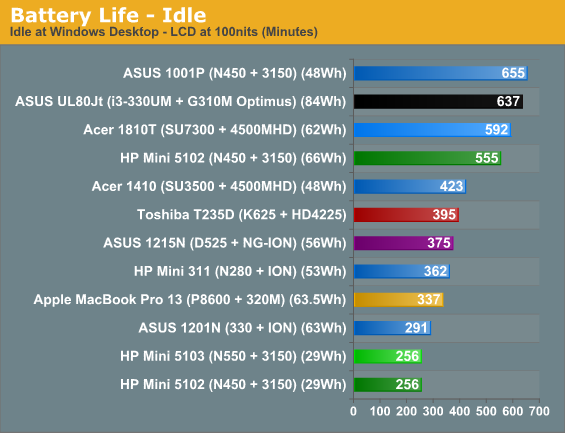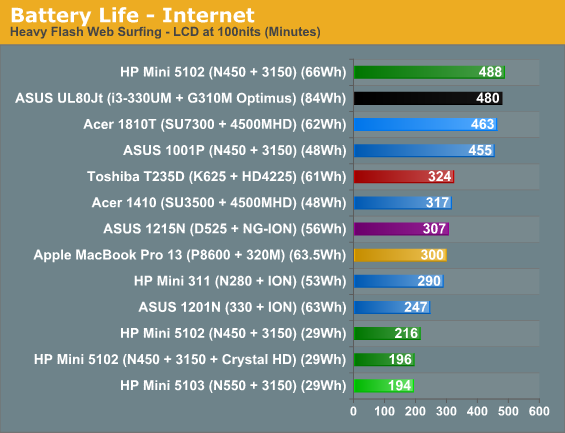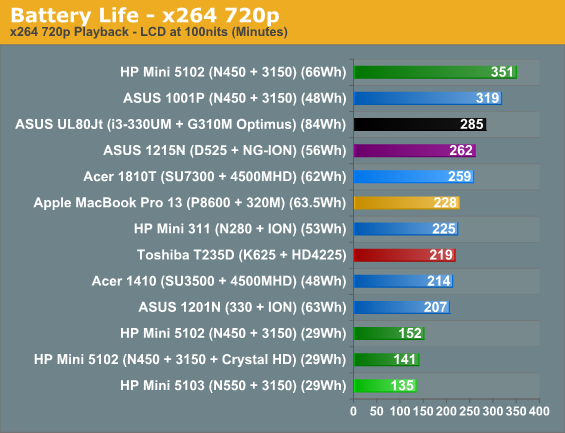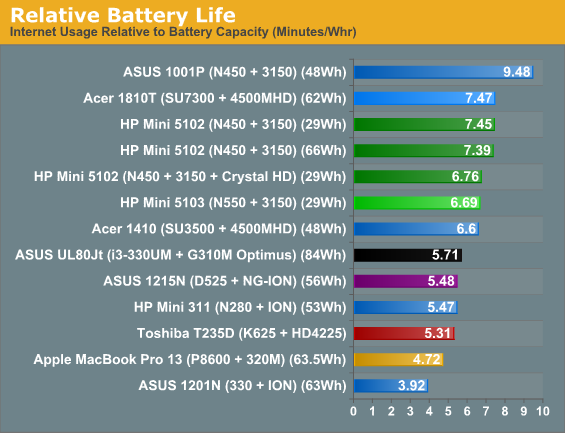HP Mini 5103: Looking at the Dual-Core Atom N550
by Jarred Walton on December 17, 2010 1:05 PM ESTHP Mini 5103 Battery Life
When we tested the 5102, we had both the standard 29Wh and a larger 66Wh battery. Since we only have the 29Wh with the 5103, we’re leaving both results in for the 5102. Note also that the CrystalHD chip tends to reduce battery life a small amount, and we only tested with it installed in the 5103. As you can see, the 5102 and 5103 get similar battery life out of the 4-cell battery, so you should see the same improvement with the 6-cell upgrade.




Despite having a second CPU core, the 5103 actually comes very close to matching the 5102. Of course, the 5102 has to contend with DDR2 memory instead of DDR3, so that does penalize it somewhat. Overall, though, battery life on the N550 looks to be very close to the older N450. The slower core clock does play a role as well, but looking at performance in general it’s a worthwhile compromise—for Atom CPUs at least. You’ll notice that the old CULV Timeline 1810T still manages better relative battery life than the 5103, and it also offers much better performance—for the CPU as well as GPU. Certainly other N550 based netbooks might improve on the 5103, but at least in this case the battery life is far too close to substantially faster offerings.










57 Comments
View All Comments
JarredWalton - Friday, December 17, 2010 - link
CPU Bench is for desktop because those are able to run on a consistent platform. To do a mobile bench, we'd need all of the various mobile CPUs, and several laptops that allow us to switch out CPUs. Basically, comparing desktop and mobile CPUs is apples to oranges; both are fruit, but they're not in the same family. We don't have server chips in bench either, for the same reasons.Of course, we would like to put together a mobile version of bench, but we haven't yet hashed out how to best accomplish that task.
rundll - Friday, December 17, 2010 - link
"we also expect to see them jump on the Brazos bandwagon next year. That could mean improved performance in every area relative to Atom, hopefully without sacrificing battery life."Your hope won't be fulfilled. And the reason is very very simple.
The faster Brazos, Zacate (1,6GHz), has a TDP of 18 W. This model beats by 10-20 % the double-core N550 and 8,5 W TDP Atom. Of course, the graphics performance is in a class of its own. But the key words here are 18W vs 8,5W.
The slower Brazos, Ontario (1,0GHz), has a TDP of 9 W. But this chip should end up being slower than aforementioned Atom.
nafhan - Friday, December 17, 2010 - link
Well, there's more to battery life than the TDP of processor/chipset combo, and there's more to a computer than it's battery life. A good computer is all about balance, and AMD is betting that Brazos based netbooks will be more balanced than Atom ones. That said, if battery life is bad enough, it will be a problem. We'll find out soon.duploxxx - Saturday, December 18, 2010 - link
very very soon, since HP will anounce mini notebook within a few days with brazos at CES.Indeed TDP doesn't mean anything at all. Preview of anandtech already showed that together with other review sites. Single threaded perf will be much better on brazos then this one, multi not. GPU is a no brainer and not even to be mentioned for comparisson :)
DanNeely - Friday, December 17, 2010 - link
Assuming linear scaling and looking at the cinebench numbers (the only bench that was obviously single threaded) the 1.2ghz, 9W brazos will be 20-25% faster than an atom. The atoms will still have an edge in multi-threaded apps; but where windows netbooks hurt the worst is in single threaded UIs, so AMD could have a winner here in general usability even if Intel managed to win more total benchmarks.Roland00Address - Saturday, December 18, 2010 - link
Thus you can't compare the tdps and find out battery life. First tdp is worst case scenario, for the worst chips at the hottest time, it isn't the the average full load power consumption. Furthermore you can't establish the average power consumption of an item just by knowing the maximum power consumption, you need to know the idle power consumption and how long the item is in the different power consumptions states.For example see below link
http://www.pcper.com/article.php?aid=1039&type...
The SU2300 has a tdp of 10w, the Ion Chipset (first gen) has a tdp of 12w or so. So total tdp is about 22 watts. If we compare it to the Zacate/Brazos which has a tdp of 18w, using your logic we assume the tdp should only be about 4 watts apart. But what is obtained in reality is a difference of 9 to 12 watts depending on whether the system is on idle, load (cinemark), or load (gaming).
Or put another way the d510 has a tdp of 13w the chipsett has a tdp of 2w thus total tdp is 15w. It should have a lower power consumption than the zacate system if you were just looking at tdp. Yet the Zacate/Brazos system beats it at idle power consumption, load power consumption on cinemark but the Zacate/Brazos system uses more power when load gaming.
Taft12 - Monday, December 20, 2010 - link
Wow, properly owned several times. I guess you'll never mistake TDP for actual system power consumption again.rundll - Tuesday, December 21, 2010 - link
Owned? My ass.You guys try despirately convince that 18W TDP Zacate has lower power consumption than 8,5W TDP Atom. Good luck with that, I don't buy it.
AMD does partially very sloppy work here 'cause even the single core Zacate has 18W TDP.
Surely one can argue around the subject but me being owned? My ass.
When comparing double core 9W TDP Ontario at 1 GHz and double core 8,5W TDP Atom at 1,5 GHz the winner in power consumpion can actually go either way. I don't actually make any statement in my first post concerning power consumption but simple make an edjucated guess that Atom might end up being faster. Surely one can argue here what ever he wants but me owned here? My ass.
Here again AMD does partially sloppy work with this new chip 'cause even the single core Ontario has TDP of 9W. Single core Atom has 6,5W TDP. The difference in TDPs is so significant that real life power consumption win can easely go to Atom.
Again this surely can be debated over but me being owned? My ass.
JarredWalton - Tuesday, December 21, 2010 - link
So going off of this:http://www.anandtech.com/show/4023/the-brazos-perf...
Comparing the Atom D510 to the Brazos E-350, AMD wins pretty much every meaningful test on the CPU side. That's a dual-core 1.6GHz beating the dual-core + Hyper-Threading 1.66GHz. The best result is in the single-threaded Cinebench test, where E-350 wins by 65%. Cut the clock speed down to 1.0GHz (or 1.2GHz single-core) and it should still be able to compete. I suppose the N550 looked at in this article will come out ahead on quite a few benchmarks relative to the netbook AMD parts, but only on the CPU side.
The other factor is the GPU, which is the wild card. These are still not gaming systems, but Brazos ought to be able to do HD Flash (and other HD content) where Atom on its own cannot. Unless there's a huge performance deficit (i.e. more than 30%), we'll be looking at really slow Atom vs. slightly slower Brazos on the CPU side. We'll also have okay Brazos vs. completely pathetic GMA 3150 on the GPU side. The question will then become pricing as well, because if Brazos netbooks end up at $450, you can simply get Atom + NG-ION to effectively get around the GPU argument.
I do have to admit that my "hopefully" is probably optimistic, but until I have final hardware I won't call the battle won or lost by AMD. I do think that the Bobcat architecture has some potential to win the netbook/nettop contest with some tweaks, but at the current specs it doesn't look like it will happen. Instead of getting the equivalent of CULV + decent IGP at netbook pricing, we'll get Atom + decent IGP at higher than basic netbook pricing.
rundll - Tuesday, December 21, 2010 - link
I'd like to emphasize here that I took stand to the battery life in the first place. Just like the headline above tells.1. Zacate, the 18W TDP part of Brazos, won't beat 8,5W TDP Atom in battery life. This is my original statement and what I really wanted to point out. Obviously I don't have hard evidence on that but I absolutely stick to my statement anyway.
2. Ontario, the 9W TDP part of Brazos, will or will not beat the aforementioned Atom in battery life. I simply didn't take any stand here either way. Instead I pointed out that here Atom will probably win the speed contest.
All the time I referred to the double core models since that's what was tested in the article. And yes, I was talking about the CPUs. And just because of that I also stated that Brazos' graphics are superior. But this is just some sort of a foot note 'cause my point being the battery life (and also the performance aspect couldn't been totally overlooked since you said this: <em>"That could mean improved performance in every area relative to Atom, hopefully without sacrificing battery life"</em>.
Further more, one can raise doubts that even in single core models Atom will win the battery life contest over Brazos. Zacate will lose, that's for sure. Ontario has a good chance to lose but this remains to be seen.
I also think like you that AMD can and will win some design wins here, the graphic performance being that good. And especially when the price plays in. But that's another story.